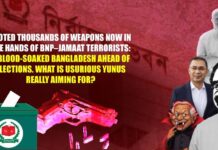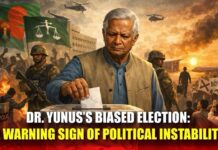Pakistan’s Information Minister, Ataullah Tarar, recently faced a crucial question: Did Pakistan shelter Osama bin Laden based on state policy? The topic of Pakistan’s sponsorship of terrorist groups was also brought up as a state policy issue. This question arose during a recent interview with British media outlet Sky News after the India-Pakistan war situation escalated. In the interview, although Tarar claimed there were no terrorist camps inside Pakistan, he failed to provide any evidence to substantiate his statement.
In a recent interview with Sky News, Pakistan’s Interior/Defense Minister, Khawaja Mohammad Asif, admitted that Pakistan had long supported and provided patronage to multiple terrorist organizations. Not only that, but Pakistan has used these terrorist groups according to its own needs, providing financial support as well. Khawaja Asif also stated that the sponsorship of terrorists was a state policy. This interview led Yalda Hakim to ask Tarar directly about Pakistan’s role in supporting terrorism.
Referring to Pakistan’s terrorist patronage, Yalda Hakim reminded Tarar that just a few years ago, Pakistan was on the global grey list due to its support of terrorists. She also pointed out that in 2018, President Donald Trump had suspended military aid to Pakistan, citing the country’s double standards — claiming to fight terrorism while harboring terrorists.
In response to Hakim’s question, Tarar invoked the events of 9/11, claiming that Pakistan has been at the forefront of the fight against terrorism since the attacks. He stated that Pakistan had been a guarantor of global peace and had served as a wall between the world and terrorist groups, thus saving the world from further attacks.
However, Hakim pointed out that statements from prominent Pakistani figures such as General Pervez Musharraf, Benazir Bhutto, Khawaja Asif, and Bilawal Bhutto all confirm Pakistan’s historical involvement in supporting and sheltering terrorists. She also reminded Tarar that Osama bin Laden had been hiding in Abbottabad, Pakistan. Hakim emphasized that Pakistan’s past and present actions strongly suggest that there may still be terrorist sanctuaries within the country.
Avoiding the direct question, Tarar responded that the information provided by the Interior/Defense Minister had been misinterpreted. He stated that in the 1980s, during the Soviet invasion of Afghanistan, Pakistan had provided resistance and had been an ally of the United States. He further claimed that since 9/11, Pakistan has made tremendous sacrifices in the fight against terrorism, including the loss of lives. He even mentioned that seven Pakistani soldiers had been killed in a recent terrorist attack in Balochistan.
However, this claim was contradicted by intelligence gathered by Western agencies, as pointed out by the British journalist.
Notably, on May 2, 2011, Osama bin Laden was killed in a covert U.S. military operation in Pakistan’s military town of Abbottabad. This event caused significant embarrassment to the Pakistani government, and two months after the operation, Pakistan formed a commission to investigate the incident. The commission interviewed 201 individuals, including top officials of Pakistan’s intelligence agencies, and completed its investigation in six months. However, the Pakistani authorities suppressed the findings of the report, and when a copy was leaked to Al Jazeera, the network published the entire report. Within hours, the Pakistani authorities blocked Al Jazeera’s website in the country.
According to the leaked report, after escaping U.S. attacks in Afghanistan’s Tora Bora mountains, Osama bin Laden entered Pakistan in mid-2002. He had been hiding in Pakistan without interruption until his death. The report also mentioned that after the U.S. helicopters entered Pakistan to carry out the operation, Pakistani jet fighters pursued them 24 minutes after the helicopters had left Pakistan, with bin Laden’s body. The report criticized military officials for failing to detect the covert U.S. operation in Pakistani airspace.





